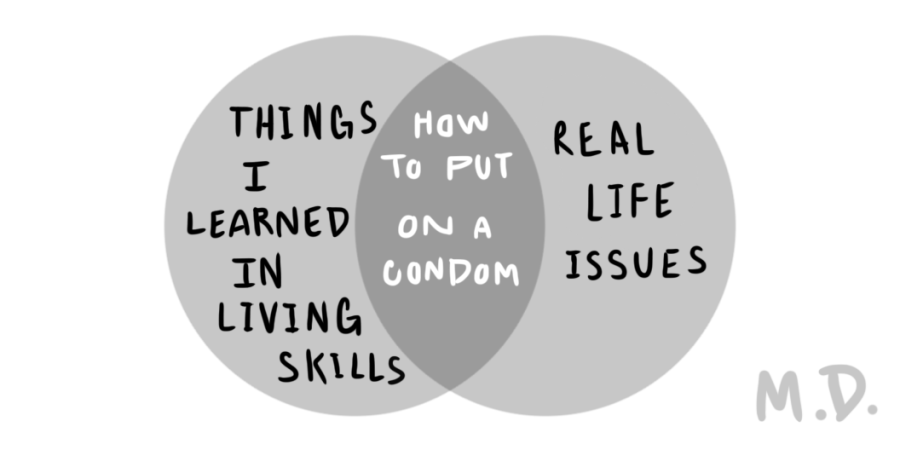Most parents want to ensure their children have the skills required to succeed in whatever path they choose. However, there is only so much a parent can teach their child.
Immediately after graduating from Paly, seniors are released into the world to live away from home for the first time. But how are they expected to thrive without having learned the practical skills needed in life?
Of the course’s content, only a small portion of it includes skills that can be applied in the future.
When enrolling in Living Skills, one would expect to gain the necessary knowledge to help guide them through life. While this course touches on extremely important general topics, such as mental health, sexual education and social justice issues, Paly does not offer a course that teaches students simple, applicable tasks — like balancing a checkbook and paying household bills.
The main focus of Paly’s Living Skills class is wellness, health and finding one’s identity. The class syllabus lists many learning objectives including lessons on drugs and alcohol, racism, sexism, sexual safety and the gender spectrum. Although Living Skills does a fantastic job in promoting social emotional learning — critical components for succeeding in college and in the future — there are plenty of other relevant concepts that students could benefit from learning in the class.
In our complex society composed of intricate tax systems, insurance rates and voting polls, the real world can be immensely confusing to navigate, especially for young adults who have been sheltered by their parents for the majority of their lives.
“From first-hand experience, I have seen very knowledgeable students who have slowly fallen behind due to not knowing how to deal with living alone and being independent,” said Paly graduate Nathalia Castillo (‘17). “Learning how to build your credit, manage credit cards without falling into debt and balancing checkbooks are just a handful of skills that should be taught in high school.”
Not only do many graduates leave Paly unprepared for the real world, but many students forget the material taught in Living Skills soon after completing the course, according to Castillo. To remedy this problem, the course should must be geared towards making the significant information resonate with students.
Of the course’s content, only a small portion of it includes skills that can be applied in the future. For example, even though the curriculum for Living Skills involves instruction on how to maintain a balanced diet, there is no unit on the basics of cooking. While Paly provides a culinary course, students enroll in it since it is not a required class. This inability to cook a healthy meal leads to the consumption of cheap, artificial foods with the potential to cause health issues.
Right now especially, in an era full of booming technology and advanced learning, young adults are becoming more intellectual, yet many still lack the basic skills required to get them through certain situations. An individual might have the facilities to acquire a job, but not the background information on how to build a resume or conduct successful interviews. This is a necessary unit Living Skills instructors should spend at least a few weeks teaching.
Nevertheless, some students who attended the summer session of Living Skills report that the program briefly addressed the subject of finance. Even though the summer class includes a segment of information about money, the content did not have any lasting effects.
“There was one speaker who came in and gave us a lecture on basic finance, but I don’t remember much from it,” junior Natalie Churchley said. “[Instead] we pretty much just watched a movie every day about drugs, eating healthy and social pressures.”
A finance unit is desperately needed in the Living Skills curriculum, as it is a prominent part of adult life. This lack of coordination between the semester program and the summer program leaves many under prepared. Teachers must streamline the two curricula in order to create better communication and a more specific course structure.
In the long run, it will be more valuable for students to learn about useful tips for the future, as well as the current class syllabus.
Castillo said, “The Living Skills curriculum should be redesigned to focus on life after high school.”

